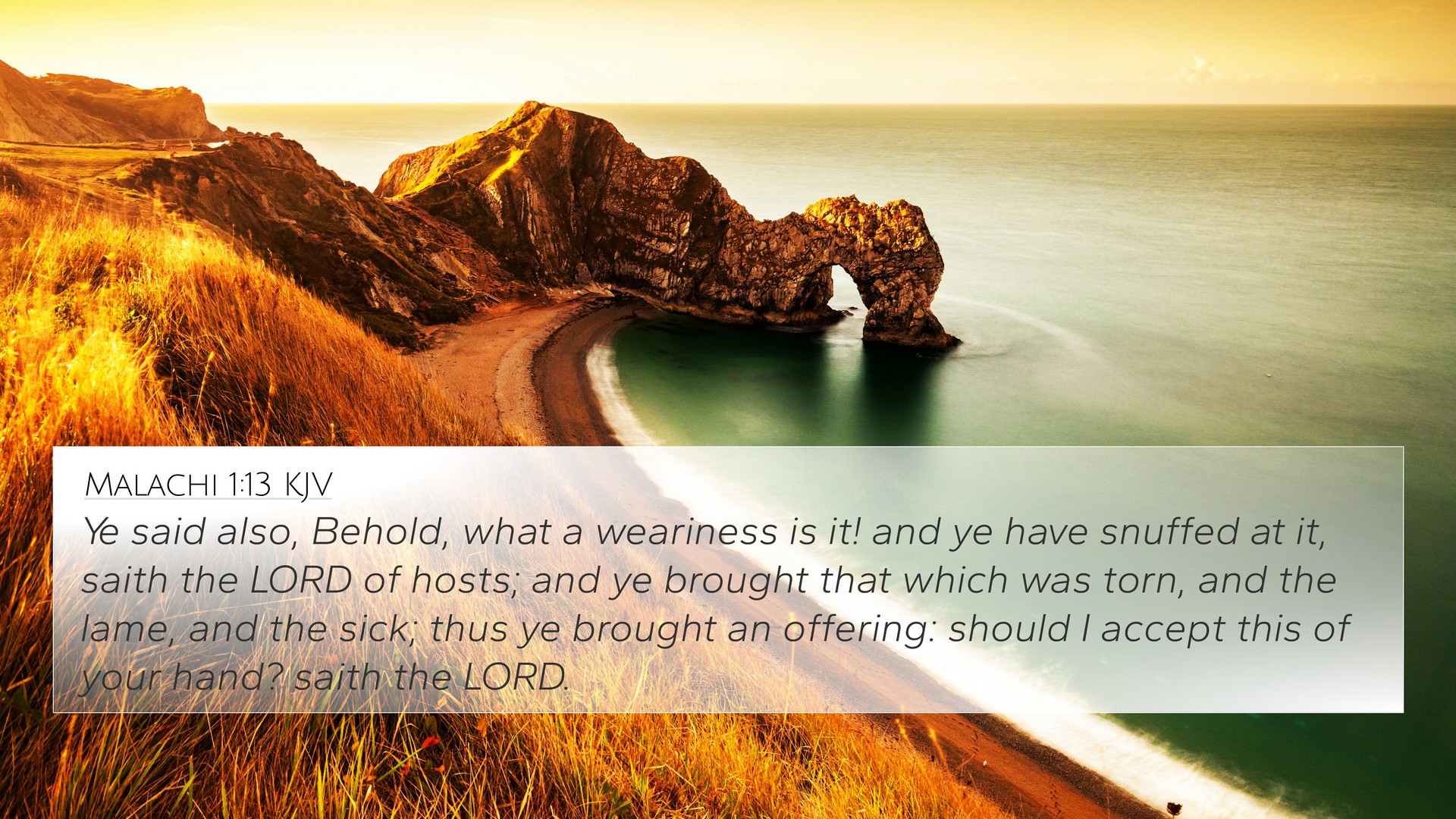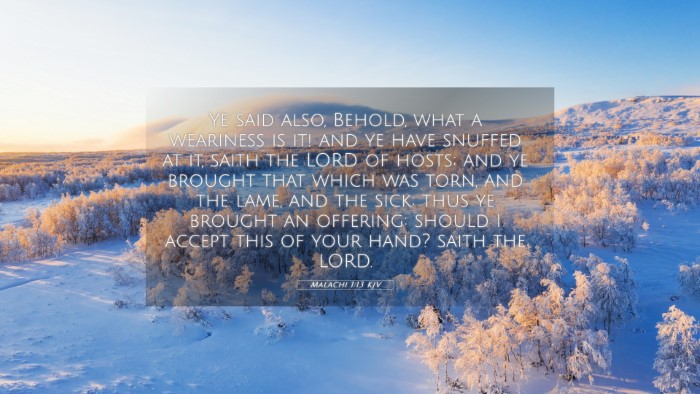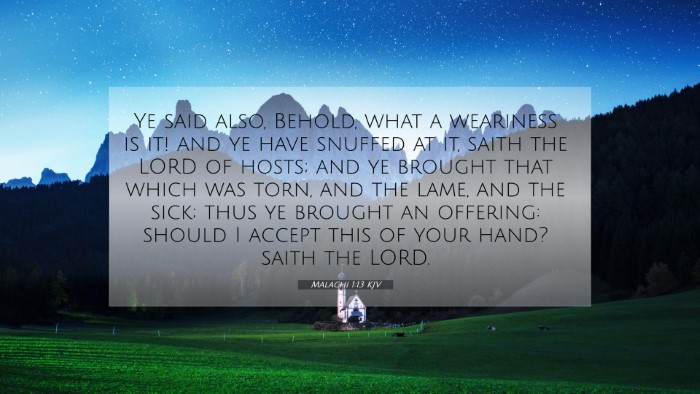Old Testament
Genesis Exodus Leviticus Numbers Deuteronomy Joshua Judges Ruth 1 Samuel 2 Samuel 1 Kings 2 Kings 1 Chronicles 2 Chronicles Ezra Nehemiah Esther Job Psalms Proverbs Ecclesiastes Song of Solomon Isaiah Jeremiah Lamentations Ezekiel Daniel Hosea Joel Amos Obadiah Jonah Micah Nahum Habakkuk Zephaniah Haggai Zechariah MalachiMalachi 1:13 Similar Verses
Malachi 1:13 Cross References
Ye said also, Behold, what a weariness is it! and ye have snuffed at it, saith the LORD of hosts; and ye brought that which was torn, and the lame, and the sick; thus ye brought an offering: should I accept this of your hand? saith the LORD.
Uncover the Rich Themes and Topics of This Bible Verse
Listed below are the Bible themes associated with Malachi 1:13. We invite you to explore each theme to gain deeper insights into the Scriptures.
Malachi 1:13 Cross Reference Verses
This section features a detailed cross-reference designed to enrich your understanding of the Scriptures. Below, you will find carefully selected verses that echo the themes and teachings related to Malachi 1:13 KJV. Click on any image to explore detailed analyses of related Bible verses and uncover deeper theological insights.
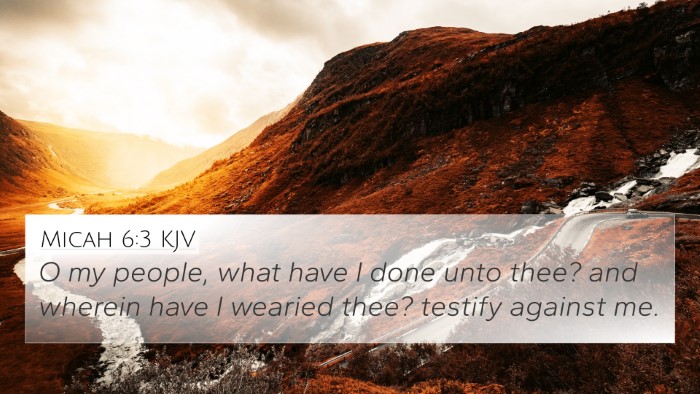
Micah 6:3 (KJV) »
O my people, what have I done unto thee? and wherein have I wearied thee? testify against me.
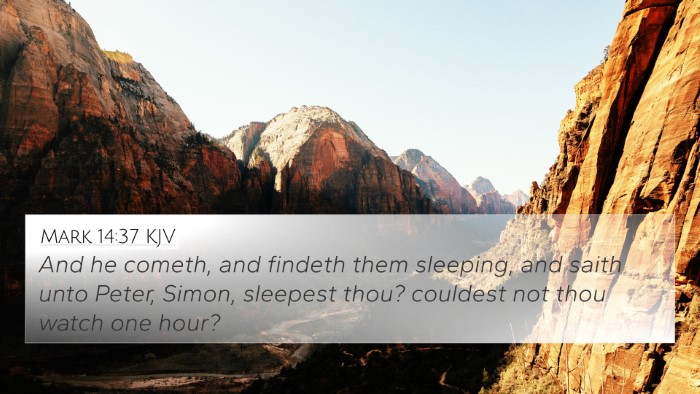
Mark 14:37 (KJV) »
And he cometh, and findeth them sleeping, and saith unto Peter, Simon, sleepest thou? couldest not thou watch one hour?
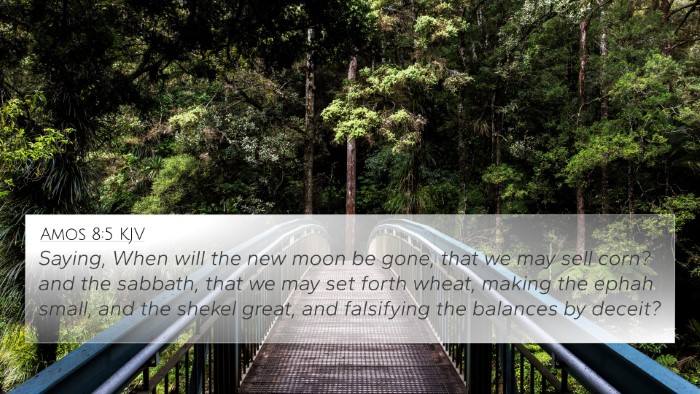
Amos 8:5 (KJV) »
Saying, When will the new moon be gone, that we may sell corn? and the sabbath, that we may set forth wheat, making the ephah small, and the shekel great, and falsifying the balances by deceit?
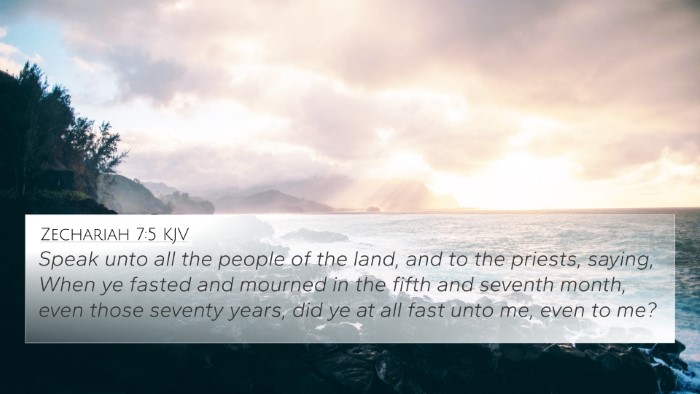
Zechariah 7:5 (KJV) »
Speak unto all the people of the land, and to the priests, saying, When ye fasted and mourned in the fifth and seventh month, even those seventy years, did ye at all fast unto me, even to me?
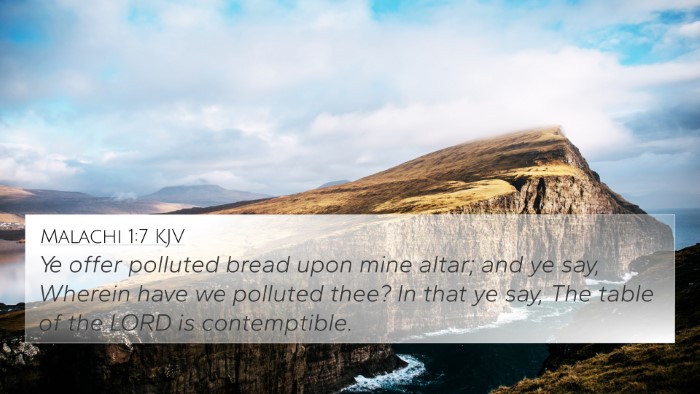
Malachi 1:7 (KJV) »
Ye offer polluted bread upon mine altar; and ye say, Wherein have we polluted thee? In that ye say, The table of the LORD is contemptible.

Malachi 2:13 (KJV) »
And this have ye done again, covering the altar of the LORD with tears, with weeping, and with crying out, insomuch that he regardeth not the offering any more, or receiveth it with good will at your hand.
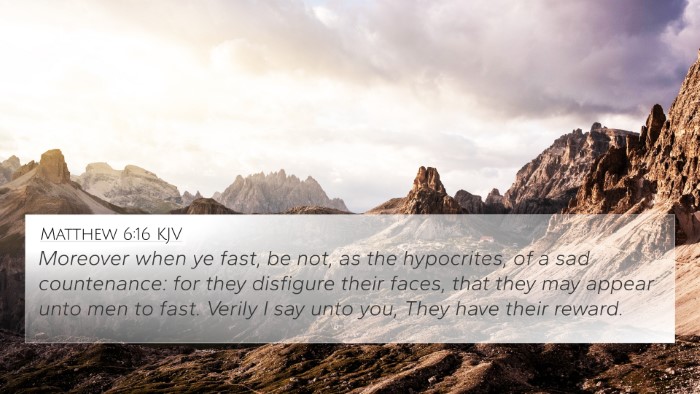
Matthew 6:16 (KJV) »
Moreover when ye fast, be not, as the hypocrites, of a sad countenance: for they disfigure their faces, that they may appear unto men to fast. Verily I say unto you, They have their reward.
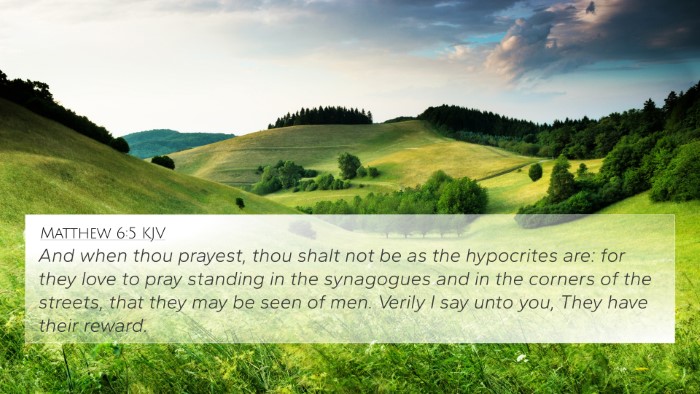
Matthew 6:5 (KJV) »
And when thou prayest, thou shalt not be as the hypocrites are: for they love to pray standing in the synagogues and in the corners of the streets, that they may be seen of men. Verily I say unto you, They have their reward.
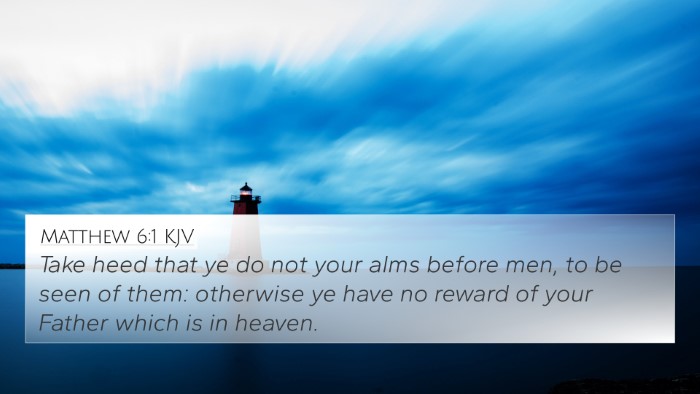
Matthew 6:1 (KJV) »
Take heed that ye do not your alms before men, to be seen of them: otherwise ye have no reward of your Father which is in heaven.

Mark 14:4 (KJV) »
And there were some that had indignation within themselves, and said, Why was this waste of the ointment made?
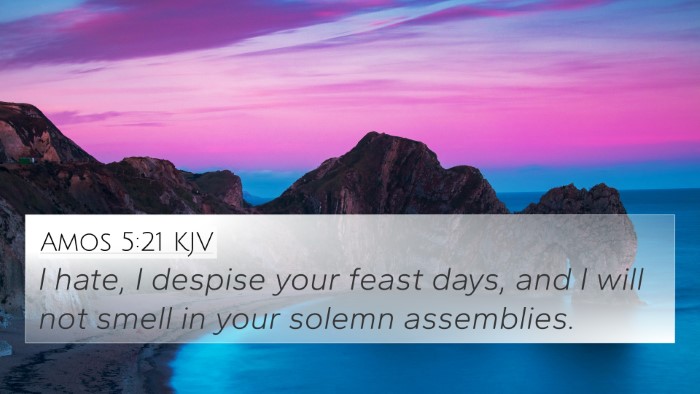
Amos 5:21 (KJV) »
I hate, I despise your feast days, and I will not smell in your solemn assemblies.
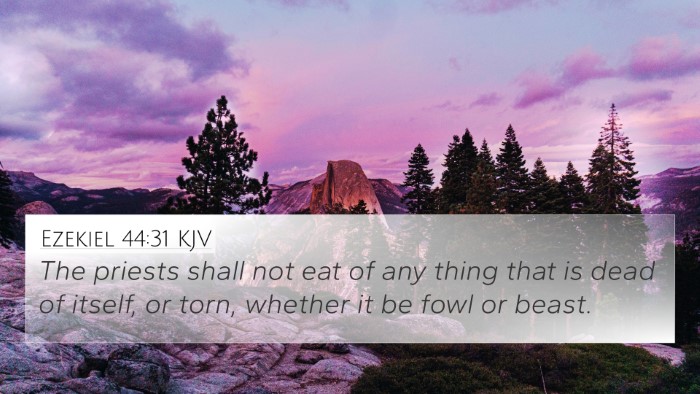
Ezekiel 44:31 (KJV) »
The priests shall not eat of any thing that is dead of itself, or torn, whether it be fowl or beast.
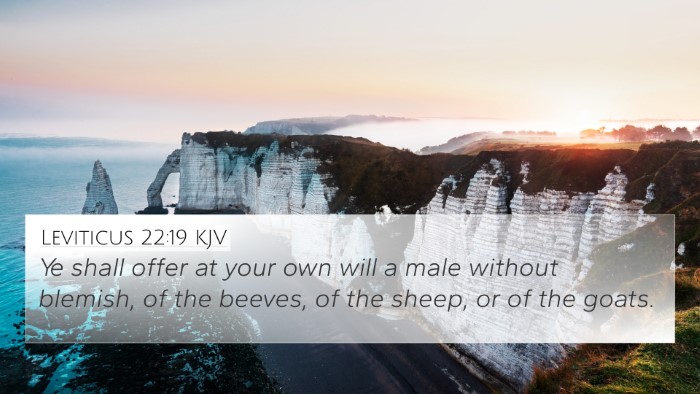
Leviticus 22:19 (KJV) »
Ye shall offer at your own will a male without blemish, of the beeves, of the sheep, or of the goats.
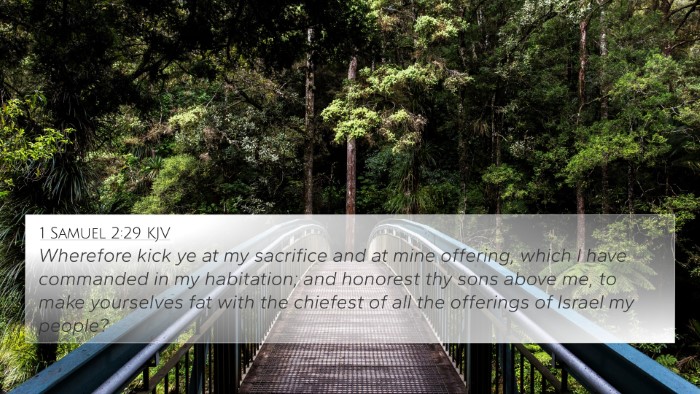
1 Samuel 2:29 (KJV) »
Wherefore kick ye at my sacrifice and at mine offering, which I have commanded in my habitation; and honorest thy sons above me, to make yourselves fat with the chiefest of all the offerings of Israel my people?
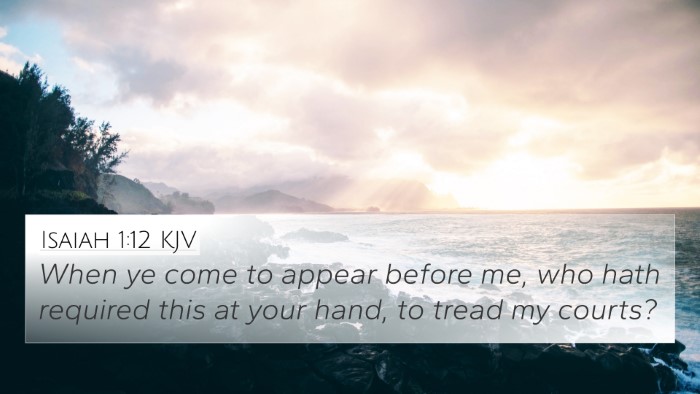
Isaiah 1:12 (KJV) »
When ye come to appear before me, who hath required this at your hand, to tread my courts?
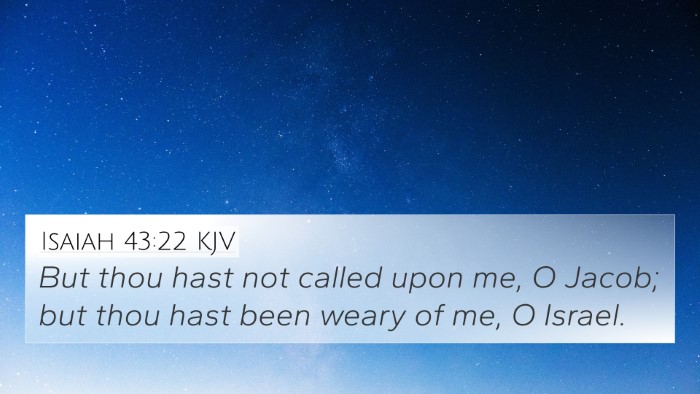
Isaiah 43:22 (KJV) »
But thou hast not called upon me, O Jacob; but thou hast been weary of me, O Israel.
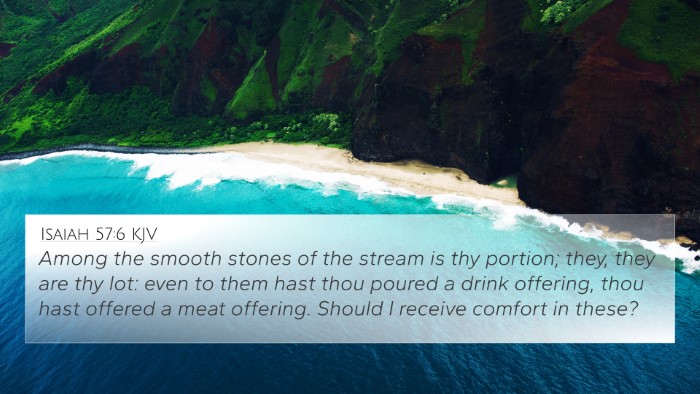
Isaiah 57:6 (KJV) »
Among the smooth stones of the stream is thy portion; they, they are thy lot: even to them hast thou poured a drink offering, thou hast offered a meat offering. Should I receive comfort in these?
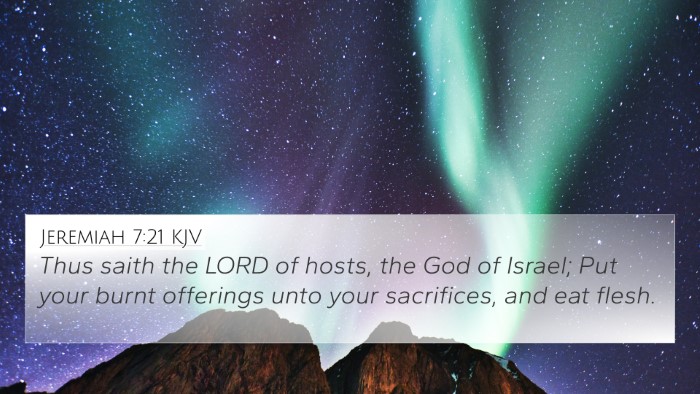
Jeremiah 7:21 (KJV) »
Thus saith the LORD of hosts, the God of Israel; Put your burnt offerings unto your sacrifices, and eat flesh.
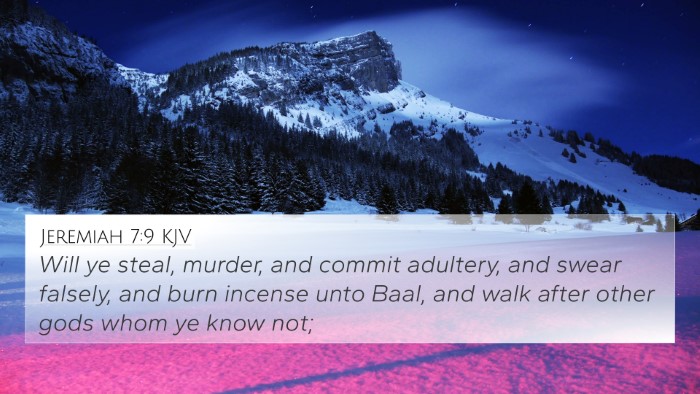
Jeremiah 7:9 (KJV) »
Will ye steal, murder, and commit adultery, and swear falsely, and burn incense unto Baal, and walk after other gods whom ye know not;

Ezekiel 4:14 (KJV) »
Then said I, Ah Lord GOD! behold, my soul hath not been polluted: for from my youth up even till now have I not eaten of that which dieth of itself, or is torn in pieces; neither came there abominable flesh into my mouth.
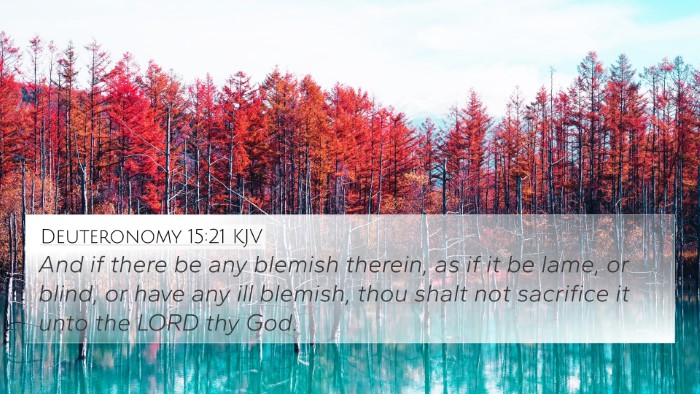
Deuteronomy 15:21 (KJV) »
And if there be any blemish therein, as if it be lame, or blind, or have any ill blemish, thou shalt not sacrifice it unto the LORD thy God.
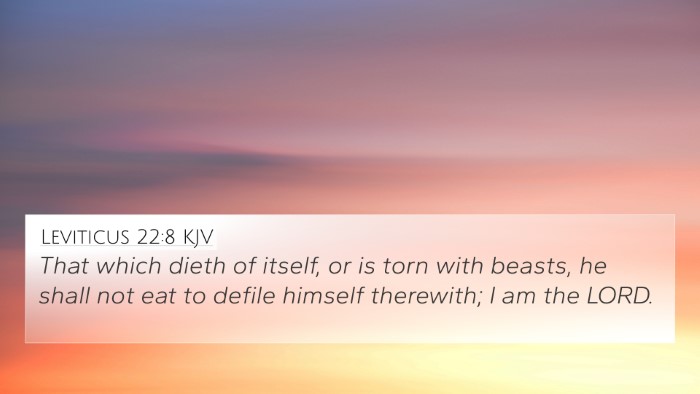
Leviticus 22:8 (KJV) »
That which dieth of itself, or is torn with beasts, he shall not eat to defile himself therewith; I am the LORD.
Malachi 1:13 Verse Analysis and Similar Verses
Understanding Malachi 1:13
Verse: "Ye said also, Behold, what a weariness is it! and ye have snuffed at it, saith the Lord of hosts; and ye brought that which was torn, and the lame, and the sick; thus ye brought an offering: should I accept this of your hand? saith the Lord." (Malachi 1:13)
Summary of the Verse
Malachi 1:13 highlights the attitude of the people of Israel toward their offerings and worship. The verse reflects their disdain for the proper way to worship God, indicating that their offerings were not genuine but rather a burden. Their actions show a lack of respect for God's commands and a misunderstanding of the importance of their sacrifices.
Exegesis from Public Domain Commentaries
The following insights combine perspectives from renowned Bible commentaries:
-
Matthew Henry:
Henry emphasizes the insincerity of the people’s worship. He notes that they regarded their sacrifices as wearisome and burdensome, which revealed their lack of reverence for God. Malachi's words remind the people that their mundane actions and lack of enthusiasm in worship led to a rejection of their offerings.
-
Albert Barnes:
Barnes discusses the significance of the animals brought for sacrifice, stating that God expected perfect and unblemished offerings. The actions of the people in offering lame and sick animals demonstrated their disregard for God’s standards, highlighting their disobedience and a transactional view of worship rather than a relational one.
-
Adam Clarke:
Clarke offers insights into the emotional state of the people, suggesting that their complaints about the burden of worship were reflective of a deeper spiritual malaise. He argues that when worship is seen as a chore, it leads to a diminished spiritual life and a lack of true connection with God.
Bible Verse Cross-References
This verse relates to several other scriptures that discuss the themes of worship, sacrifice, and the attitude of the heart towards God:
- Isaiah 1:13-14: "Bring no more vain oblations; incense is an abomination unto me; the new moons and sabbaths, the calling of assemblies, I cannot away with; it is iniquity, even the solemn meeting." – This verse parallels Malachi in criticizing empty rituals.
- Matthew 15:8-9: "This people draweth nigh unto me with their mouth, and honoureth me with their lips; but their heart is far from me." – This reflects the hypocrisy of worship without true devotion.
- 1 Samuel 15:22: "And Samuel said, Hath the Lord as great delight in burnt offerings and sacrifices, as in obeying the voice of the Lord?" – This emphasizes obedience over ritualistic worship.
- Psalms 51:16-17: "For thou desirest not sacrifice; else would I give it: thou delightest not in burnt offering. The sacrifices of God are a broken spirit: a broken and contrite heart." – Here, the focus is on the condition of the heart.
- Hosea 6:6: "For I desired mercy, and not sacrifice; and the knowledge of God more than burnt offerings." – This highlights the priority of relational understanding over mere offerings.
- James 1:26-27: "If any man among you seem to be religious, and bridleth not his tongue, but deceiveth his own heart, this man's religion is vain." – This illustrates that true religion is evident in behavior, not just in ritual.
- Micah 6:6-8: "Wherewith shall I come before the Lord, and bow myself before the high God? ... He hath shewed thee, O man, what is good; and what doth the Lord require of thee, but to do justly, and to love mercy, and to walk humbly with thy God?" – This asks what is truly required of God's people.
Thematic Bible Verse Connections
This verse indicates broader themes within Scripture regarding worship and sacrifice:
- The Nature of True Worship: Understanding God's desire for authenticity in worship (John 4:24).
- God's Standards for Sacrifices: Emphasizing the importance of the heart behind sacrifices (Hebrews 11:4).
- The Role of Offerings in Relationship with God: Reflecting on how worship connects with our daily lives (Romans 12:1).
- Rejection of False Worship: God’s call for repentance and reconnection (Revelation 3:15-16).
Conclusion
Malachi 1:13 serves as a profound reminder of the importance of genuine worship and sincere sacrifice. The combined insights from various biblical commentaries provide depth to our understanding of this verse. Engaging in cross-referencing with related scriptures not only enriches one’s study but also highlights the interconnectedness of biblical themes. For those seeking to explore further, tools for Bible cross-referencing and comprehensive study materials can enhance one’s insight into these critical themes.
Tools for Further Study
For deeper exploration of cross-references and related themes in the Bible, consider using the following resources:
- Bible concordance for identifying themes.
- Bible cross-reference guide for studying related verses.
- Cross-reference Bible study methodologies for connecting scriptures.
- Bible reference resources and chain references for thematic studies.
